Wednesday, July 17th 2013

More Core i7-4960X "Ivy Bridge-E" Benchmarks Surface
More benchmarks of Intel's upcoming socket LGA2011 flagship client processor, the Core i7-4960X "Ivy Bridge-E," surfaced on the web. Tom's Hardware scored an engineering sample of the chip, and wasted no time in comparing it with contemporaries across three previous Intel generations, and AMD's current generation. These include chips such as the i7-3970X, i7-4770K, i7-3770K, i7-2700K, FX-8350, and A10-5800K.
In synthetic tests, the i7-4960X runs neck and neck with the i7-3970X, offering a 5 percent performance increment at best. It's significantly faster than the i7-3930K, Intel's $500-ish offering for over 7 quarters running. Its six cores and twelve SMT threads give it a definite edge over quad-core Intel parts in multi-threaded synthetic tests. In single-threaded tests, the $350 i7-4770K is highly competitive with it. The only major surprise on offering is power-draw. Despite its TDP being rated at 130W, on par with the i7-3960X, the i7-4960X "Ivy Bridge-E" offers significantly higher energy-efficiency, which can be attributed to the 22 nm process on which it's built, compared to its predecessor's 32 nm process. Find the complete preview at the source.
Source:
Tom's Hardware
In synthetic tests, the i7-4960X runs neck and neck with the i7-3970X, offering a 5 percent performance increment at best. It's significantly faster than the i7-3930K, Intel's $500-ish offering for over 7 quarters running. Its six cores and twelve SMT threads give it a definite edge over quad-core Intel parts in multi-threaded synthetic tests. In single-threaded tests, the $350 i7-4770K is highly competitive with it. The only major surprise on offering is power-draw. Despite its TDP being rated at 130W, on par with the i7-3960X, the i7-4960X "Ivy Bridge-E" offers significantly higher energy-efficiency, which can be attributed to the 22 nm process on which it's built, compared to its predecessor's 32 nm process. Find the complete preview at the source.
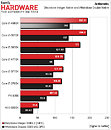
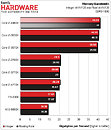
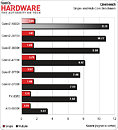
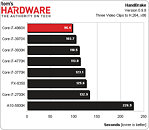
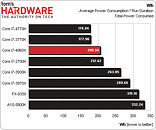
72 Comments on More Core i7-4960X "Ivy Bridge-E" Benchmarks Surface
What we want is haswell-E
All I wanted to see from LGA2011 is better power consumption, and looks like Ivy Bridge E will bring that.
Since I am entitled to an opinion just as you are, I'll stick with my relatively quiet computer, fairly cool room and a ~100w processor that provides great, predictable performance across the board because I don't want my HD 7970 and 120Hz monitor being under-utilized in non-DX11 games which already happens even with my processor. Have fun with your FX 9370 or whatever you ordered. ;)
"ohhh, the differance between 2600K and 3770K is very very small, i bet the 4960X will be much faster than the 3970X"
duhhhhh
I think Intel has just stalled in the water for the time being, till they make another break through in architecture.
It looks good, but to upgrade? Na I don't think so. If anything i think AMD is going to knock our socks off soon and sway the blue team to move back to the red side but that's just my opinion :rolleyes:
Time will tell the story, but for now we just allllll got to wait it out ;)
What keeps me interested is how will this Ivy Hexa overclocks thanks to 22nm shrink and soldered IHS combo.
Also lol at delusional AMD trolls.
The real deal are Xeon based IB (it should have more cores/cache than SB).
And I also don't get why a lot of people are shocked here, we all knew how will IB 2011 perform.
I can come up with no logical explanation for the situation in that photo.......
on topic:
I know were enthusiast an all but seriously people.... times are changing its all about low power now. The highend hardware is decades ahead of its software requirements. Sandy bridge can pretty much chew through anything now and the next 5 years coming .... Intel focus has shifted. Until the need for uber power returns this is what we get. amd has alot of time to become current...
Why should I be forced to buy something "worse" for the sake of not being called a fanboy? I mainly use my computer for gaming, and not at 60Hz, which means the CPU better have every ounce of performance and feed my video card the best it can as most of the games I play regularly are equally or more CPU bound than GPU bound (TF2, Planetside 2, Minecraft, Skyrim...). This is why I've also avoided the LGA 2011 platform, as it's rather dated.
Let's not forget that my 4770K is overclocked by 900MHz, and at stock it was dominating all but maybe two game tests where the 9590 has a ~2-5 FPS lead. How else am I supposed to convince you that I want to buy whatever is good at the time? But no, it's not AMD, so Jstn7477 is a "fanboy" just because.
Statement 2: Where are the numbers for a 4930k or the equivalent? The 4960x is interesting, but not double the price (assuming the same relationship of SB-e is maintained in IB-e) interesting.
Statement 3: Haswell-e is a rather pointless endeavor. The same minor CPU performance increases mean that there won't be a lot of performance gains. The big benefit to Haswell-e is going to be a better PCH and host of new features. DDR4, full SATA III, and a few other features are what is going to make Haswell-e a viable platform.
Statement 4: Intel has no competition at this price point. There is almost no market, and the market that does exist is a monopoly. People will pay for these processors, but they don't have to make huge leaps to compare to their competition. This means more development dollars are going to graphics and CPU component integration. It's bad for those that want a calculation beast, but Intel isn't catering to this market any more.
My opinion, I'm not spending money on IB-e. The performance increases over SB-e are minor. The lack of an announced successor to X79 means there isn't going to be better board options, and the options that still exist are pretty depressing. An decrease in the consumed power is great, but it'd take a decade to justify spending $500 on a new processor for it.
I'm really hoping that the 4 core IB-e is worth picking up.